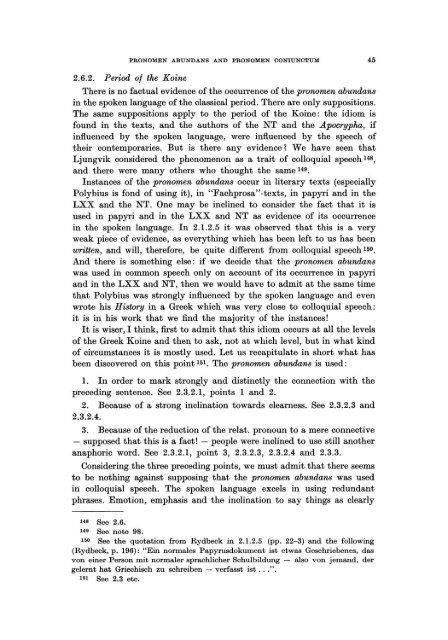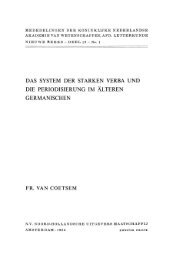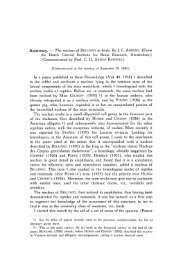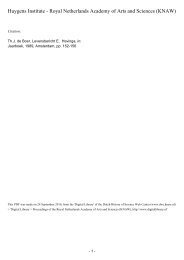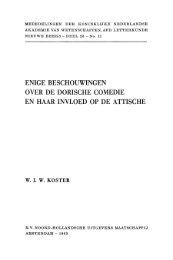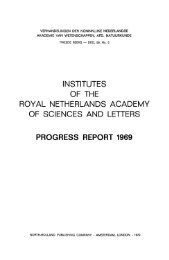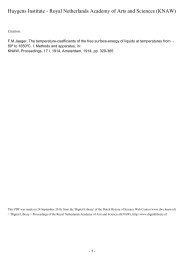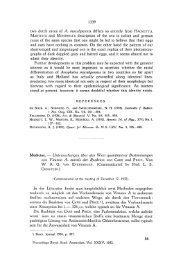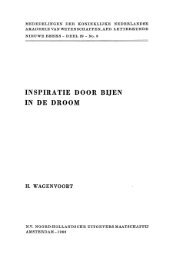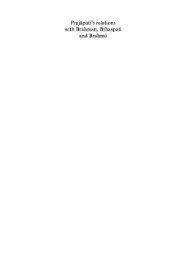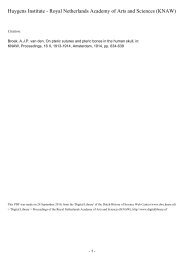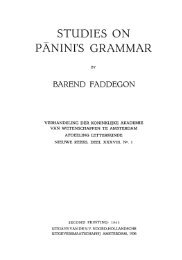Pronomen Abundans and Pronomen Coniunctum. A ... - DWC
Pronomen Abundans and Pronomen Coniunctum. A ... - DWC
Pronomen Abundans and Pronomen Coniunctum. A ... - DWC
You also want an ePaper? Increase the reach of your titles
YUMPU automatically turns print PDFs into web optimized ePapers that Google loves.
PRONOMEN ABUNDANS AND PRONOMEN CONIUNCTUM 45<br />
2.6.2. Period ot the Koine<br />
There is no factual evidence of the occurrence of the pronomen abundans<br />
in the spoken language of the classical period. There are only suppositions.<br />
The same suppositions apply to the period of the Koine: the idiom is<br />
found in the texts, <strong>and</strong> the authors of the NT <strong>and</strong> the Apocrypha, if<br />
influenced by the spoken language, were influenced by the speech of<br />
their contemporaries. But is there any evidence? We have seen that<br />
Ljungvik considered the phenomenon as a trait of colloquial speech 148,<br />
<strong>and</strong> there were many others who thought the same 149.<br />
Instanees of the pronomen abundans occur in literary texts (especially<br />
Polybius is fond of using it), in "Fachprosa" -texts, in papyri <strong>and</strong> in the<br />
LXX <strong>and</strong> the NT. One may be inclined to consider the fact that it is<br />
used in papyri <strong>and</strong> in the LXX <strong>and</strong> NT as evidence of its occurrence<br />
in the spoken language. In 2.1.2.5 it was observed that this is a very<br />
weak piece of evidence, as everything which has been left to us has been<br />
written, <strong>and</strong> will, therefore, be quite different from colloquial speech 150.<br />
And there is something else: if we decide that the pronomen abundans<br />
was used in common speech only on account of its occurrenee in papyri<br />
<strong>and</strong> in the LXX <strong>and</strong> NT, then we would have to admit at the same time<br />
that Polybius was strongly influenced by the spoken language <strong>and</strong> even<br />
wrote his History in a Greek which was very close to colloquial speech:<br />
it is in his work that we find the majority of the instanees!<br />
It is wiser, I think, first to admit that this idiom occurs at all the levels<br />
of the Greek Koine <strong>and</strong> then to ask, not at which level, but in what kind<br />
of circumstances it is mostly used. Let us recapitulate in short what has<br />
been discovered on this point 151. The pronomen abundans is used:<br />
1. In order to mark strongly <strong>and</strong> distinctly the connection with the<br />
preceding sentence. See 2.3.2.1, points 1 <strong>and</strong> 2.<br />
2. Because of astrong inclination towards clearness. See 2.3.2.3 <strong>and</strong><br />
2.3.2.4.<br />
3. Because of the reduction of the relat. pronoun to a mere connective<br />
- supposed that this is a fact! - people were inclined to use still another<br />
anaphoric word. See 2.3.2.1, point 3, 2.3.2.3, 2.3.2.4 <strong>and</strong> 2.3.3.<br />
Considering the three preceding points, we must admit that there se ems<br />
to be nothing against supposing that the pronomen abundans was used<br />
in colloquial speech. The spoken language excels in using redundant<br />
phrases. Emotion, emphasis <strong>and</strong> the inclination to say things as clearly<br />
148 See 2.6.<br />
149 See note 98.<br />
150 See the quotation from Rydbeck in 2.1.2.5 (pp. 22-3) <strong>and</strong> the following<br />
(Rydbeck, p . 196): "Ein normales Papyrusdokument ist etwas Geschriebenes, das<br />
von einer Person mit normaler sprachlicher Schulbildung - also von jem<strong>and</strong>, der<br />
gelernt hat Griechisch zu schrei ben - verfasst ist ...".<br />
151 See 2.3 etc.


